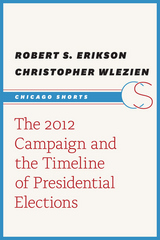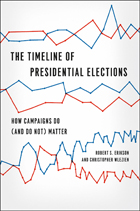2 books about Erikson, Robert S.

The 2012 Campaign and the Timeline of Presidential Elections
Robert S. Erikson and Christopher Wlezien
University of Chicago Press, 2014
Do voters cast ballots for the candidates whose positions best match their own? Or does the race for president come down to who runs the most effective campaign? In their book, The Timeline of Presidential Elections, published in 2012, Erikson and Wlezien documented how both factors come into play. Having amassed data from national polls covering presidential elections from 1952 to 2008, they could track how outcomes take shape over the course of an election year. But they wanted to know whether Barak Obama’s historic 2012 campaign would follow the same pattern.
This e-book both presents the central arguments from Timeline and updates the statistical analysis to include data from 2012. The authors also use the 2012 presidential campaign as a test of the empirical patterns they found in the previous fifteen elections. They show that Obama’s campaign conforms to their projections, and they confirm that it is through campaigns that voters are made aware of--or not made aware of--fundamental factors like candidates’ policy positions that determine which ticket will get their votes. In other words, fundamentals matter, but only because of campaigns. The 2012 Campaign and the Timeline of Presidential Elections will be useful in courses on the election process.
[more]

The Timeline of Presidential Elections
How Campaigns Do (and Do Not) Matter
Robert S. Erikson and Christopher Wlezien
University of Chicago Press, 2012
In presidential elections, do voters cast their ballots for the candidates whose platform and positions best match their own? Or is the race for president of the United States come down largely to who runs the most effective campaign? It’s a question those who study elections have been considering for years with no clear resolution. In The Timeline of Presidential Elections, Robert S. Erikson and Christopher Wlezien reveal for the first time how both factors come into play.
Erikson and Wlezien have amassed data from close to two thousand national polls covering every presidential election from 1952 to 2008, allowing them to see how outcomes take shape over the course of an election year. Polls from the beginning of the year, they show, have virtually no predictive power. By mid-April, when the candidates have been identified and matched in pollsters’ trial heats, preferences have come into focus—and predicted the winner in eleven of the fifteen elections. But a similar process of forming favorites takes place in the last six months, during which voters’ intentions change only gradually, with particular events—including presidential debates—rarely resulting in dramatic change.
Ultimately, Erikson and Wlezien show that it is through campaigns that voters are made aware of—or not made aware of—fundamental factors like candidates’ policy positions that determine which ticket will get their votes. In other words, fundamentals matter, but only because of campaigns. Timely and compelling, this book will force us to rethink our assumptions about presidential elections.
[more]
READERS
Browse our collection.
PUBLISHERS
See BiblioVault's publisher services.
STUDENT SERVICES
Files for college accessibility offices.
UChicago Accessibility Resources
home | accessibility | search | about | contact us
BiblioVault ® 2001 - 2024
The University of Chicago Press









